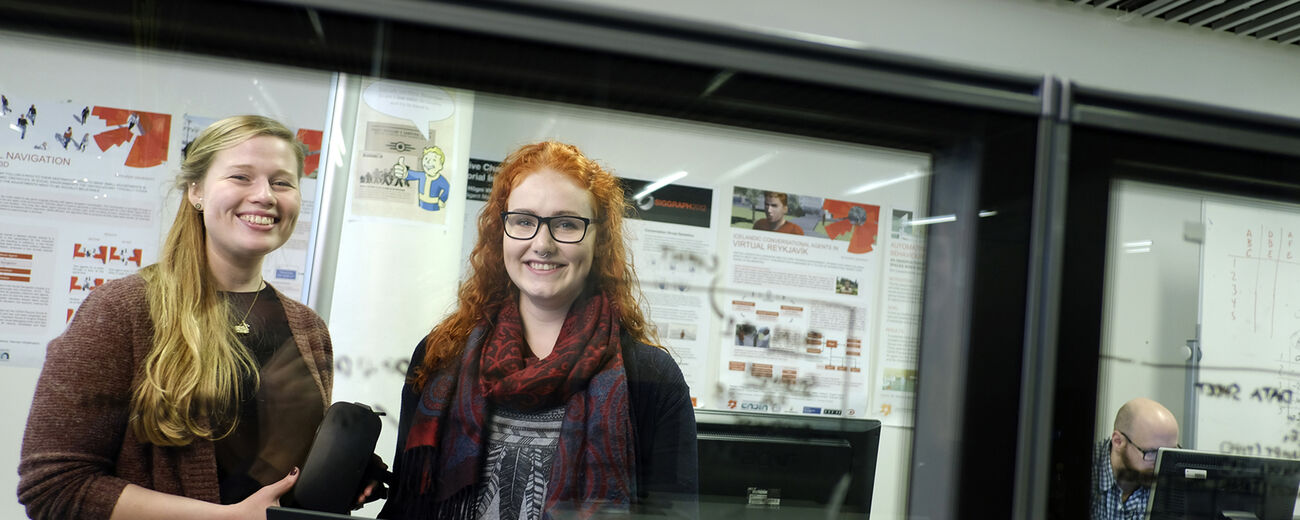M.Sc. Software Engineering
With a M.Sc. degree in Software Engineering, students obtain a solid background in subjects that are in high demand in software-heavy industries. In addition to undergraduate-level studies, the MS.c. degree allows students to obtain a deeper understanding of relevant practices and techniques necessary to make a difference in real-world practice.
Overview

Level: Graduate
Credits: 120 ECTS
Language of instruction: English
Duration: Two years, full-time.
Start date: August
Program leader: Dr. Grischa Liebel
Courses
Students can opt for either traditional course-based studies or research-based studies. Both approaches provide students with significant advantages in the industry and prepare them for further studies.
Highlights
- Small class sizes and close interaction between students and faculty.
- Students can work on cutting-edge research within one of our research centers, for example on Artificial Intelligence, Theoretical Computer Science, Language Technology and Software systems.
Structure
The Master's programme in Software Engineering is ordinarily completed in two years. The programme is available through two study routes, course based or research based. Please view the module handbook for more information.
Course-based route
Students who opt for the course-based route will spend three semesters studying various courses. In the last semester, they will be required to write their thesis. To successfully complete the program, students must complete 90 ECTS credits of coursework and a minimum of 30 ECTS credits of project work, which can be completed either individually or in a group.
Research-based route
Students who opt for the research-based track will take courses for two semesters and dedicate one year to working on a research project. Throughout their coursework, students are required to complete a minimum of 60 ECTS credits. The remaining 60 ECTS credits will be devoted to an individual research project, which will be supervised by a faculty member.
|
M.Sc. Software Engineering courses |
|---|
Mandatory courses
|
Possible elective courses
|
Students who want to earn credit towards their degree by taking courses from our undergraduate programs or courses outside the Department of Computer Science/Engineering must ensure that the courses meet the following criteria: undergraduate courses should be advanced-level BSc courses, and the course content should be different from what the student has previously studied. A list of qualifying undergraduate courses will be published before the start of each semester.
Admission
- B.Sc. degree in Software Engineering or a related field is required.
For those in the final year of study, satisfactory completion of the degree will be a condition for entry. Students whose first degree is not in Software Engineering may be required to complete preparatory classes from the undergraduate Software Engineering degree at Reykjavik University.
English language requirements
For students whose first language is not English, proof of English proficiency must be provided.
- Minimum English language scores: TOEFL: 577 (PBT) or above OR IELTS: 6.5 or above.
Exemptions from English language requirements.
- Students who have completed one year of university level education and the medium of instruction was English, do not need to submit English language test scores.
- Native English speakers, (Australia, Great Britain, Ireland, New Zealand, USA)
- Countries exempted from English skills requirements: Due to equal national admission requirements for universities in countries as in Iceland: Finland, Netherlands, Norway, Sweden, Denmark
Supporting documents
- CV/resume
- Official university transcript/s
You should submit a detailed record of your higher education up to the present, including programmes of study taken and grades achieved. If you have not yet completed your undergraduate degree, you should provide an official interim transcript detailing grades achieved to date. - English language test score certificate (non-native speakers only)
You should upload a scanned copy of the original English language test certificate. If you do not have test results at the time of applying, you should submit your application without these scores and send them to us separately once available. - Language test waiver (if required)
The requirement to provide English proficiency scores may be waived in cases where you have successfully completed, or are currently completing, a full-time degree-level course of a minimum of nine months at a recognized institution where the medium of instruction and assessment is entirely in English. If you wish to apply for a waiver of the English language test requirement, you will need to upload a letter with your application outlining the reasons why you should be exempted.
- Letter of motivation (approx. 300 words)
Should include reasoning for pursuing graduate work and academic goals. - Two academic references
You should select two referees who can provide an informed view of your academic or professional ability and suitability for your chosen programme of study. The letters of recommendation should be sent directly to td@ru.is
Apply

